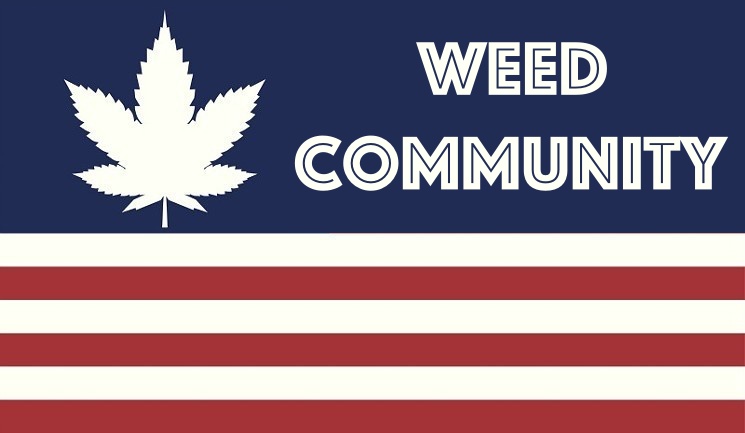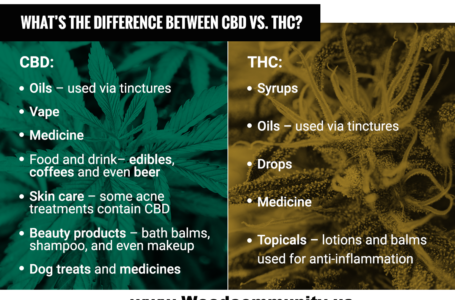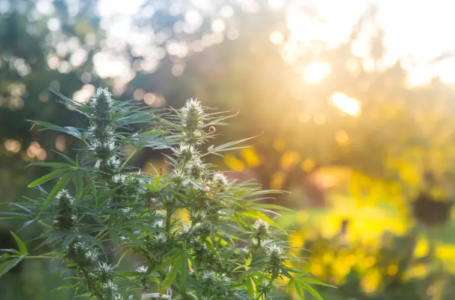As the legal use of hemp and other weed products grows, consumers are becoming more curious about their options. This includes cannabidiol (CBD) and tetrahydrocannabinol (THC), two natural compounds found in plants of the Weed genus. Both compounds interact with your body’s endocannabinoid system but have very different effects. While they may have a lot in common, they have some key differences in their use!
What is CBD?
CBD can be extracted from hemp or cannabis. Hemp and cannabis come from the Cannabis sativa plant. Legal hemp must contain 0.3% THCTrusted Source or less. CBD is sold in gels, gummies, oils, supplements, extracts, and more. CBD does not produce the high sensation associated with cannabis.
What is THC?
THC is the main psychoactive compound in cannabis that produces a high sensation. It can be consumed by smoking cannabis. It’s also available in oils, edibles, tinctures, capsules, and more.
CBD VS THC: Medical Benefits
CBD and THC have many of the same medical benefits. They can provide relief from several of the same conditions. However, CBD doesn’t cause the euphoric effects that occur with THC. Some people may prefer to use CBD because of the lack of this side effect.



CBD
In June 2018, the FDA approvedTrusted Source Epidiolex, the first prescription medication to contain CBD. It’s used to treat rare, difficult-to-control forms of epilepsy. (Epidiolex is not currently approved for any other conditions listed below.)
CBD is used to help with other various conditions, such as:
- seizures
- inflammation
- pain
- psychosis or mental disorders
- inflammatory bowel disease
- nausea
- migraine
- depression
- anxiety
According to 2020 researchTrusted Source, CBD may help with
- social anxiety
- schizophrenia
- sleep disorders
- post-traumatic stress disorders
It has yet to be approved by the FDA for these uses. More research is needed to determine whether CBD can effectively treat these conditions and others. Current clinical studies are investigating CBD as a possible treatment for:
- mood disorders
- chronic pain
- inflammatory diseases
- neurodegenerative diseases like Alzheimer’s and Parkinson’s diseases
- tumours
THC
Two synthetic formulations of THC are approved by the FDATrusted Source for treating specific conditions.
Nabilone (Cesamet) is FDA approved for treating chemotherapy-induced nausea and vomiting.
Dronabinol (Marinol, Syndros) is FDA approved to treat nausea and vomiting caused by chemotherapy drugs. It is also approved to stimulate appetite in people with AIDS or anorexia.
THC is often used to help with the following:
- pain
- muscle spasticity
- glaucoma
- insomnia
- low appetite
- nausea
- anxiety
Recent studiesTrusted Source is looking at the potential of THC to treat the following possibly:
- obstructive sleep apnea
- fibromyalgia
- chronic neuropathic pain

What is CBD Oil?
Different cannabis plants — often called hemp or marijuana — contain different levels of chemical compounds. How people breed the plant affects the CBD levels. CBD oil comes from specific strains of hemp, which are designed to have a higher CBD content than marijuana. Makers of CBD oil use different methods to extract the compound. These extracts can be used in paste form or mixed with other oils, such as hemp seed oil, to lower the viscosity of the extract. The cannabidiol (CBD) content of CBD oil varies tremendously since the manufacturers use various hemp plants and preparation techniques. CBD oils should always have less than 0.3% Delta 9 THC to be considered legal. Our products have CBD Oil from hemp (little or no THC) and have 3rd party lab results available.

Will CBD get me high?
No. All federally legal CBD products contain less than 0.3% delta-9THC, so there is no psychoactive effect from taking CBD products. The only exception is Delta-8-THC products derived from hemp, a special category amongst themselves. CBD is an entirely different compound from THC, and its effects are very complex, but it influences the body to use its endocannabinoids more effectively. CBD products should always have less than 0.3% THC to be considered legal.
WHAT IS DELTA 8 THC?
Delta 8 THC is another cannabinoid in the cannabis plant that has similar medical potential as Delta 9 THC and can serve as a great alternative. It does get you “high” while having fewer side effects than Delta 9 THC. It’s also federally legal.
Delta 8 THC may potentially provide the power and effects of both CBD and Delta 9 THC without many of the negative side effects of Delta 9 THC. Delta 8 THC will, however, unlike CBD, produce a mental high. You will often see Delta 8 THC abbreviated as D8THC, D8-THC, D8 THC, ▲8THC, or ▲8.
Delta 8 THC occurs naturally in hemp but in relatively small concentrations. For practical and economic reasons, Delta 8 THC is made in a lab by converting CBD or Delta 9 THC into Delta 8 THC through a chemical reaction.
Delta 8 THC was made legal in the 2018 Farm Bill (H.R. 2: The Agricultural Improvement Act of 2018), when it was announced that hemp and all of its derivatives and cannabinoids are 100% federally legal, except Delta 9 THC.
Though Delta 8 THC is federally legal, it still shows up as “THC” on a drug test. If you have been using Delta 8 and have an upcoming drug test, it would be smart to cleanse your system. You can read more about how to do that here.
Will Delta 8 THC get me high?
Yes. Delta 8 THC provides strong mental euphoria and body relaxation, similar to Delta 9 THC found in marijuana, but different. Many people describe it as just as strong in terms of a mental high and the various effects on the body but without the side effects some experience with marijuana (paranoia and anxiety). Delta 8 THC is also federally legal since it is converted from hemp. Delta 8 THC is also described as having less of an intoxication and more of a euphoric feeling.
In 2018, the Agriculture Improvement Act of 2018 (aka the Farm Bill) legalized CBD derived from hemp and contained no more than 0.3% Delta 9 THC (by dry weight). There is no need for a prescription or medical card to purchase hemp CBD. Having only trace amounts of THC, hemp CBD oil is non-psychoactive and federally legal.
The products on this site are sourced from hemp grown in the United States and have Certificates of Analysis (COA) from lab testing to confirm the appropriate levels of THC.
Although hemp-derived CBD is now federally legal, many states and cities are updating their laws and are not always in line with federal buyer regulations.
Delta 8 THC products are also federally legal since it is converted from CBD found in Hemp. The Farm Bill of 2018 made all cannabinoids in hemp legal except for Delta 9 THC.
OTHER CANNABINOIDS
With new cannabinoids coming to the market practically every day, it’s hard to keep up-to-date with the latest trends.
See below for information on each new cannabinoid as we get information on them.
What is HHC (Hexahydrocannabinol)?
What is Delta 10 THC?
CBN: Exploring the Research on CBN Benefits
What Are the Effects of CBG Flower?
Meet the Cannabinoids: CBN + CBG
What is THCjd?
THE ENDOCANNABINOID SYSTEM (ECS)
It wasn’t until the late 1980’s when the endocannabinoid system (ECS) was first identified, although research had begun in the 60’s and 70’s.
The ECS has two types of receptors, CB1 and CB2. CB1 receptors are found primarily in the nervous system, connective tissues and many organs. The CB2 receptors are primarily in the immune system, bones, blood vessels, endocrine glands and reproductive organs, to name a few.
The cannabinoids that are produced fit into these receptors to regulate the body’s systems. These receptors exist in every animal species. Cannabinoids are crucial to regulating all your body’s systems.

If the endocannabinoid system (ECS) is so important to regulate the body and cannabinoids are already produced by your body, why would anyone need to take more? Unfortunately, like other body parts, throwing the ECS out of balance is easy. The stress, diet, exercise routines, and other environmental factors that are part of our busy daily lives interfere with the ECS functioning properly. It needs help to rebalance.









